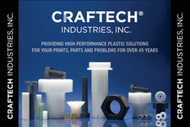Fun Facts About Plastic Fasteners
Feb 2nd 2024
Plastic fasteners may seem simple, but there are some interesting and fun facts about them:
- Early Adoption: Plastic fasteners were first introduced in the 1940s as an alternative to metal fasteners. The mass production of nylon during World War II played a significant role in popularizing plastic fasteners.
- Lightweight: Plastic fasteners are significantly lighter than their metal counterparts. This property makes them ideal for applications where weight reduction is crucial, such as in the automotive and aerospace industries.
- Versatility: Plastic fasteners come in a wide range of shapes, sizes, and configurations, allowing them to be used in diverse applications across various industries.
- Non-Corrosive: Unlike metal fasteners, plastic fasteners are non-corrosive and do not rust. This characteristic makes them suitable for use in outdoor and marine environments.
- Electrical Insulation: Many plastic materials used for fasteners have excellent electrical insulation properties, making them safe to use in electrical and electronic applications.
- Low Thermal Conductivity: Plastic fasteners have lower thermal conductivity compared to metal fasteners. This feature can be advantageous in applications where temperature variations need to be minimized.
- Color Variety: Plastic fasteners can be manufactured in a wide range of colors. This allows for easy identification and matching with specific products or branding requirements.
- Cost-Effective: Plastic fasteners are often more cost-effective than metal fasteners, especially in high-volume production scenarios.
- Recyclable: Many plastic fasteners are made from recyclable materials, making them more environmentally friendly than some metal alternatives.
- Shock Absorption: Some plastic materials used for fasteners have good shock absorption properties, making them suitable for applications where vibration and impact resistance are essential.
- Easy to Install: Plastic fasteners are generally easy to install, requiring minimal tools and effort.
- Reduced Cold Welding: Plastic fasteners tend to have a lower risk of cold welding or galling when compared to metal fasteners, which can be advantageous in certain applications.
- Customization: Plastic fasteners can be easily customized using injection molding techniques, allowing for specific designs and shapes to meet unique application requirements.
- Noise Reduction: Plastic fasteners can help reduce noise and vibration in certain applications, making them ideal for use in noise-sensitive environments.
Overall, plastic fasteners have come a long way since their introduction, and their unique properties make them a valuable and interesting part of modern engineering and manufacturing.

